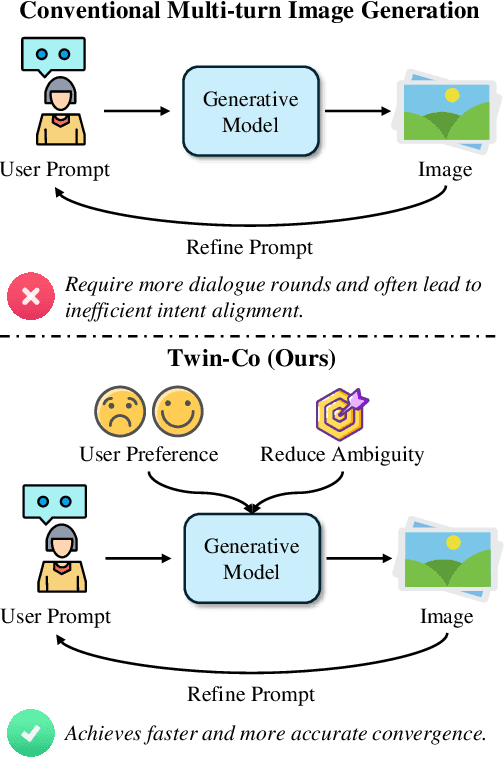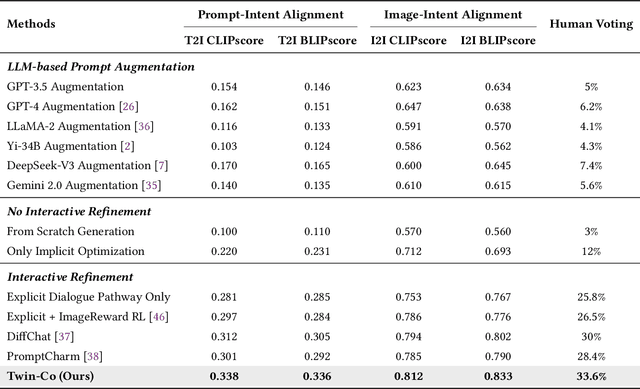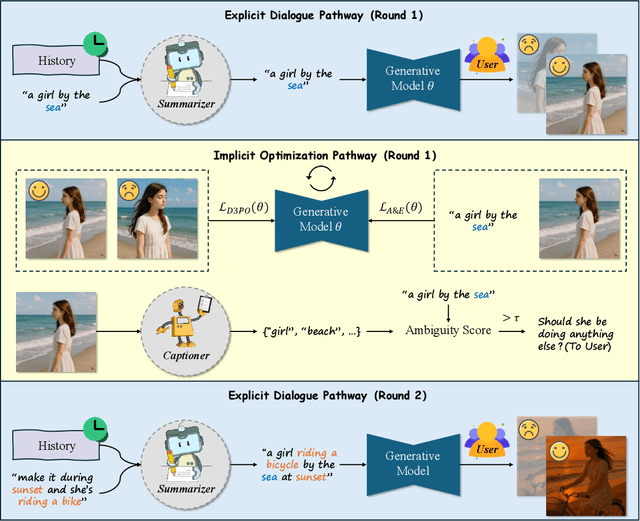Tianyu Shi
Department of Computer Science, University of Toronto
DynaWeb: Model-Based Reinforcement Learning of Web Agents
Jan 29, 2026Abstract:The development of autonomous web agents, powered by Large Language Models (LLMs) and reinforcement learning (RL), represents a significant step towards general-purpose AI assistants. However, training these agents is severely hampered by the challenges of interacting with the live internet, which is inefficient, costly, and fraught with risks. Model-based reinforcement learning (MBRL) offers a promising solution by learning a world model of the environment to enable simulated interaction. This paper introduces DynaWeb, a novel MBRL framework that trains web agents through interacting with a web world model trained to predict naturalistic web page representations given agent actions. This model serves as a synthetic web environment where an agent policy can dream by generating vast quantities of rollout action trajectories for efficient online reinforcement learning. Beyond free policy rollouts, DynaWeb incorporates real expert trajectories from training data, which are randomly interleaved with on-policy rollouts during training to improve stability and sample efficiency. Experiments conducted on the challenging WebArena and WebVoyager benchmarks demonstrate that DynaWeb consistently and significantly improves the performance of state-of-the-art open-source web agent models. Our findings establish the viability of training web agents through imagination, offering a scalable and efficient way to scale up online agentic RL.
EVM-QuestBench: An Execution-Grounded Benchmark for Natural-Language Transaction Code Generation
Jan 10, 2026Abstract:Large language models are increasingly applied to various development scenarios. However, in on-chain transaction scenarios, even a minor error can cause irreversible loss for users. Existing evaluations often overlook execution accuracy and safety. We introduce EVM-QuestBench, an execution-grounded benchmark for natural-language transaction-script generation on EVM-compatible chains. The benchmark employs dynamic evaluation: instructions are sampled from template pools, numeric parameters are drawn from predefined intervals, and validators verify outcomes against these instantiated values. EVM-QuestBench contains 107 tasks (62 atomic, 45 composite). Its modular architecture enables rapid task development. The runner executes scripts on a forked EVM chain with snapshot isolation; composite tasks apply step-efficiency decay. We evaluate 20 models and find large performance gaps, with split scores revealing persistent asymmetry between single-action precision and multi-step workflow completion. Code: https://anonymous.4open.science/r/bsc_quest_bench-A9CF/.
ComfySearch: Autonomous Exploration and Reasoning for ComfyUI Workflows
Jan 07, 2026Abstract:AI-generated content has progressed from monolithic models to modular workflows, especially on platforms like ComfyUI, allowing users to customize complex creative pipelines. However, the large number of components in ComfyUI and the difficulty of maintaining long-horizon structural consistency under strict graph constraints frequently lead to low pass rates and workflows of limited quality. To tackle these limitations, we present ComfySearch, an agentic framework that can effectively explore the component space and generate functional ComfyUI pipelines via validation-guided workflow construction. Experiments demonstrate that ComfySearch substantially outperforms existing methods on complex and creative tasks, achieving higher executability (pass) rates, higher solution rates, and stronger generalization.
Adaptive Detector-Verifier Framework for Zero-Shot Polyp Detection in Open-World Settings
Dec 16, 2025Abstract:Polyp detectors trained on clean datasets often underperform in real-world endoscopy, where illumination changes, motion blur, and occlusions degrade image quality. Existing approaches struggle with the domain gap between controlled laboratory conditions and clinical practice, where adverse imaging conditions are prevalent. In this work, we propose AdaptiveDetector, a novel two-stage detector-verifier framework comprising a YOLOv11 detector with a vision-language model (VLM) verifier. The detector adaptively adjusts per-frame confidence thresholds under VLM guidance, while the verifier is fine-tuned with Group Relative Policy Optimization (GRPO) using an asymmetric, cost-sensitive reward function specifically designed to discourage missed detections -- a critical clinical requirement. To enable realistic assessment under challenging conditions, we construct a comprehensive synthetic testbed by systematically degrading clean datasets with adverse conditions commonly encountered in clinical practice, providing a rigorous benchmark for zero-shot evaluation. Extensive zero-shot evaluation on synthetically degraded CVC-ClinicDB and Kvasir-SEG images demonstrates that our approach improves recall by 14 to 22 percentage points over YOLO alone, while precision remains within 0.7 points below to 1.7 points above the baseline. This combination of adaptive thresholding and cost-sensitive reinforcement learning achieves clinically aligned, open-world polyp detection with substantially fewer false negatives, thereby reducing the risk of missed precancerous polyps and improving patient outcomes.
Vi-SAFE: A Spatial-Temporal Framework for Efficient Violence Detection in Public Surveillance
Sep 16, 2025Abstract:Violence detection in public surveillance is critical for public safety. This study addresses challenges such as small-scale targets, complex environments, and real-time temporal analysis. We propose Vi-SAFE, a spatial-temporal framework that integrates an enhanced YOLOv8 with a Temporal Segment Network (TSN) for video surveillance. The YOLOv8 model is optimized with GhostNetV3 as a lightweight backbone, an exponential moving average (EMA) attention mechanism, and pruning to reduce computational cost while maintaining accuracy. YOLOv8 and TSN are trained separately on pedestrian and violence datasets, where YOLOv8 extracts human regions and TSN performs binary classification of violent behavior. Experiments on the RWF-2000 dataset show that Vi-SAFE achieves an accuracy of 0.88, surpassing TSN alone (0.77) and outperforming existing methods in both accuracy and efficiency, demonstrating its effectiveness for public safety surveillance. Code is available at https://anonymous.4open.science/r/Vi-SAFE-3B42/README.md.
M^3-GloDets: Multi-Region and Multi-Scale Analysis of Fine-Grained Diseased Glomerular Detection
Aug 25, 2025Abstract:Accurate detection of diseased glomeruli is fundamental to progress in renal pathology and underpins the delivery of reliable clinical diagnoses. Although recent advances in computer vision have produced increasingly sophisticated detection algorithms, the majority of research efforts have focused on normal glomeruli or instances of global sclerosis, leaving the wider spectrum of diseased glomerular subtypes comparatively understudied. This disparity is not without consequence; the nuanced and highly variable morphological characteristics that define these disease variants frequently elude even the most advanced computational models. Moreover, ongoing debate surrounds the choice of optimal imaging magnifications and region-of-view dimensions for fine-grained glomerular analysis, adding further complexity to the pursuit of accurate classification and robust segmentation. To bridge these gaps, we present M^3-GloDet, a systematic framework designed to enable thorough evaluation of detection models across a broad continuum of regions, scales, and classes. Within this framework, we evaluate both long-standing benchmark architectures and recently introduced state-of-the-art models that have achieved notable performance, using an experimental design that reflects the diversity of region-of-interest sizes and imaging resolutions encountered in routine digital renal pathology. As the results, we found that intermediate patch sizes offered the best balance between context and efficiency. Additionally, moderate magnifications enhanced generalization by reducing overfitting. Through systematic comparison of these approaches on a multi-class diseased glomerular dataset, our aim is to advance the understanding of model strengths and limitations, and to offer actionable insights for the refinement of automated detection strategies and clinical workflows in the digital pathology domain.
Gradientsys: A Multi-Agent LLM Scheduler with ReAct Orchestration
Jul 09, 2025Abstract:We present Gradientsys, a next-generation multi-agent scheduling framework that coordinates diverse specialized AI agents using a typed Model-Context Protocol (MCP) and a ReAct-based dynamic planning loop. At its core, Gradientsys employs an LLM-powered scheduler for intelligent one-to-many task dispatch, enabling parallel execution of heterogeneous agents such as PDF parsers, web search modules, GUI controllers, and web builders. The framework supports hybrid synchronous/asynchronous execution, respects agent capacity constraints, and incorporates a robust retry-and-replan mechanism to handle failures gracefully. To promote transparency and trust, Gradientsys includes an observability layer streaming real-time agent activity and intermediate reasoning via Server-Sent Events (SSE). We offer an architectural overview and evaluate Gradientsys against existing frameworks in terms of extensibility, scheduling topology, tool reusability, parallelism, and observability. Experiments on the GAIA general-assistant benchmark show that Gradientsys achieves higher task success rates with reduced latency and lower API costs compared to a MinionS-style baseline, demonstrating the strength of its LLM-driven multi-agent orchestration.
CloneShield: A Framework for Universal Perturbation Against Zero-Shot Voice Cloning
May 25, 2025Abstract:Recent breakthroughs in text-to-speech (TTS) voice cloning have raised serious privacy concerns, allowing highly accurate vocal identity replication from just a few seconds of reference audio, while retaining the speaker's vocal authenticity. In this paper, we introduce CloneShield, a universal time-domain adversarial perturbation framework specifically designed to defend against zero-shot voice cloning. Our method provides protection that is robust across speakers and utterances, without requiring any prior knowledge of the synthesized text. We formulate perturbation generation as a multi-objective optimization problem, and propose Multi-Gradient Descent Algorithm (MGDA) to ensure the robust protection across diverse utterances. To preserve natural auditory perception for users, we decompose the adversarial perturbation via Mel-spectrogram representations and fine-tune it for each sample. This design ensures imperceptibility while maintaining strong degradation effects on zero-shot cloned outputs. Experiments on three state-of-the-art zero-shot TTS systems, five benchmark datasets and evaluations from 60 human listeners demonstrate that our method preserves near-original audio quality in protected inputs (PESQ = 3.90, SRS = 0.93) while substantially degrading both speaker similarity and speech quality in cloned samples (PESQ = 1.07, SRS = 0.08).
Optimizing Multi-Round Enhanced Training in Diffusion Models for Improved Preference Understanding
Apr 25, 2025Abstract:Generative AI has significantly changed industries by enabling text-driven image generation, yet challenges remain in achieving high-resolution outputs that align with fine-grained user preferences. Consequently, multi-round interactions are necessary to ensure the generated images meet expectations. Previous methods enhanced prompts via reward feedback but did not optimize over a multi-round dialogue dataset. In this work, we present a Visual Co-Adaptation (VCA) framework incorporating human-in-the-loop feedback, leveraging a well-trained reward model aligned with human preferences. Using a diverse multi-turn dialogue dataset, our framework applies multiple reward functions, such as diversity, consistency, and preference feedback, while fine-tuning the diffusion model through LoRA, thus optimizing image generation based on user input. We also construct multi-round dialogue datasets of prompts and image pairs aligned with user intent. Experiments demonstrate that our method outperforms state-of-the-art baselines, significantly improving image consistency and alignment with user intent. Our approach consistently surpasses competing models in user satisfaction, especially in multi-turn dialogue scenarios.
Twin Co-Adaptive Dialogue for Progressive Image Generation
Apr 21, 2025



Abstract:Modern text-to-image generation systems have enabled the creation of remarkably realistic and high-quality visuals, yet they often falter when handling the inherent ambiguities in user prompts. In this work, we present Twin-Co, a framework that leverages synchronized, co-adaptive dialogue to progressively refine image generation. Instead of a static generation process, Twin-Co employs a dynamic, iterative workflow where an intelligent dialogue agent continuously interacts with the user. Initially, a base image is generated from the user's prompt. Then, through a series of synchronized dialogue exchanges, the system adapts and optimizes the image according to evolving user feedback. The co-adaptive process allows the system to progressively narrow down ambiguities and better align with user intent. Experiments demonstrate that Twin-Co not only enhances user experience by reducing trial-and-error iterations but also improves the quality of the generated images, streamlining the creative process across various applications.
 Add to Chrome
Add to Chrome Add to Firefox
Add to Firefox Add to Edge
Add to Edge